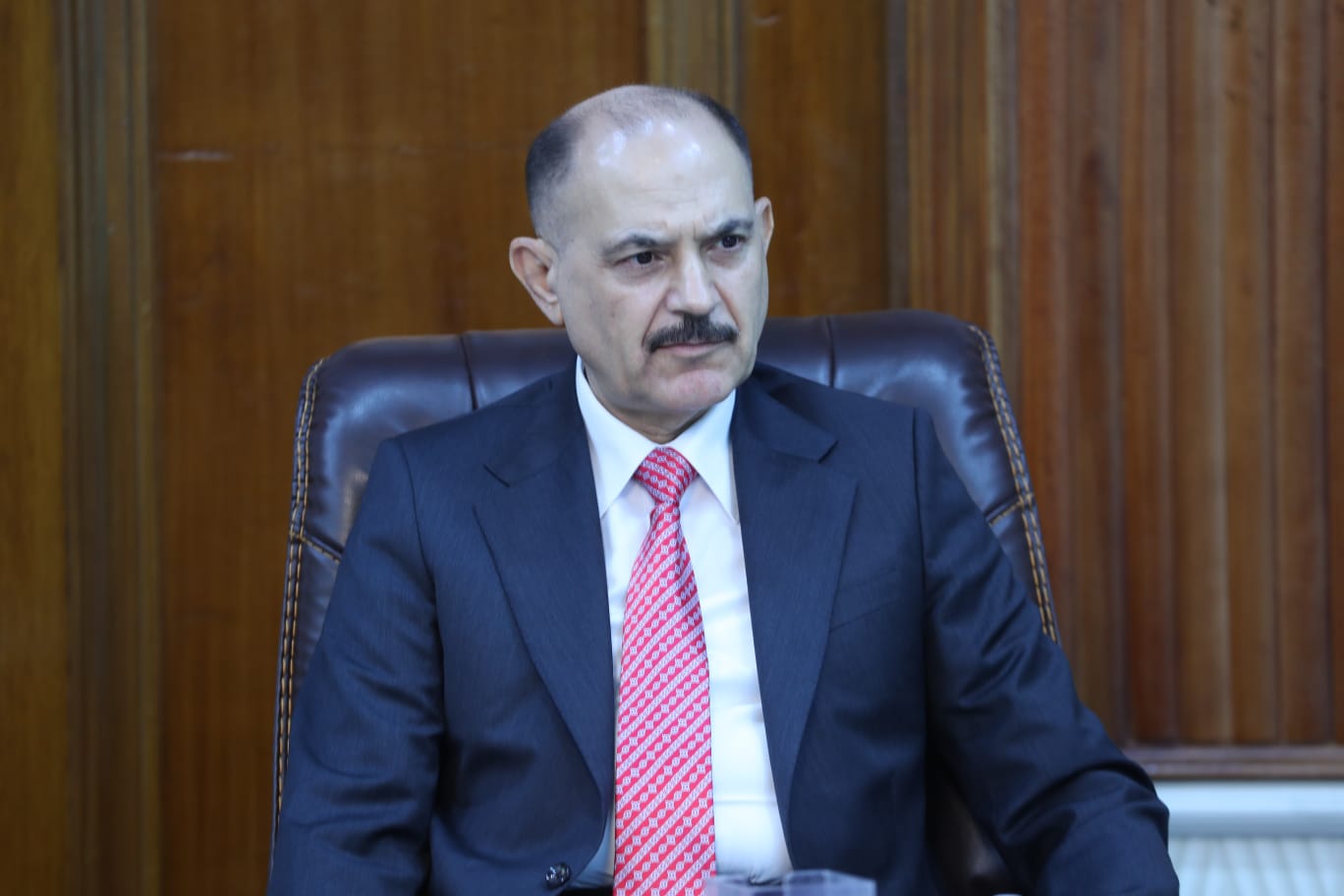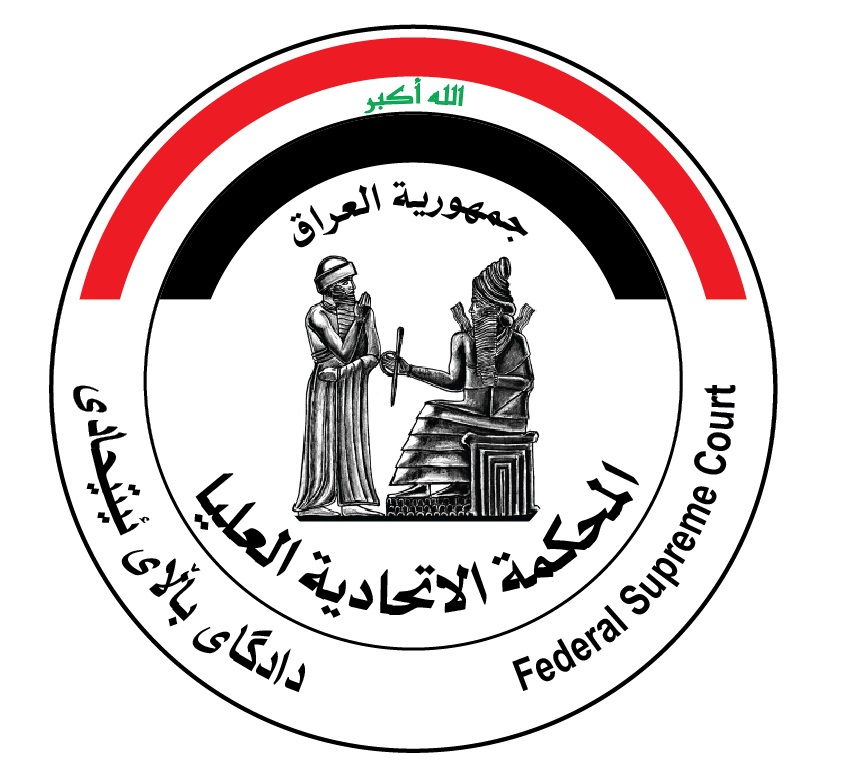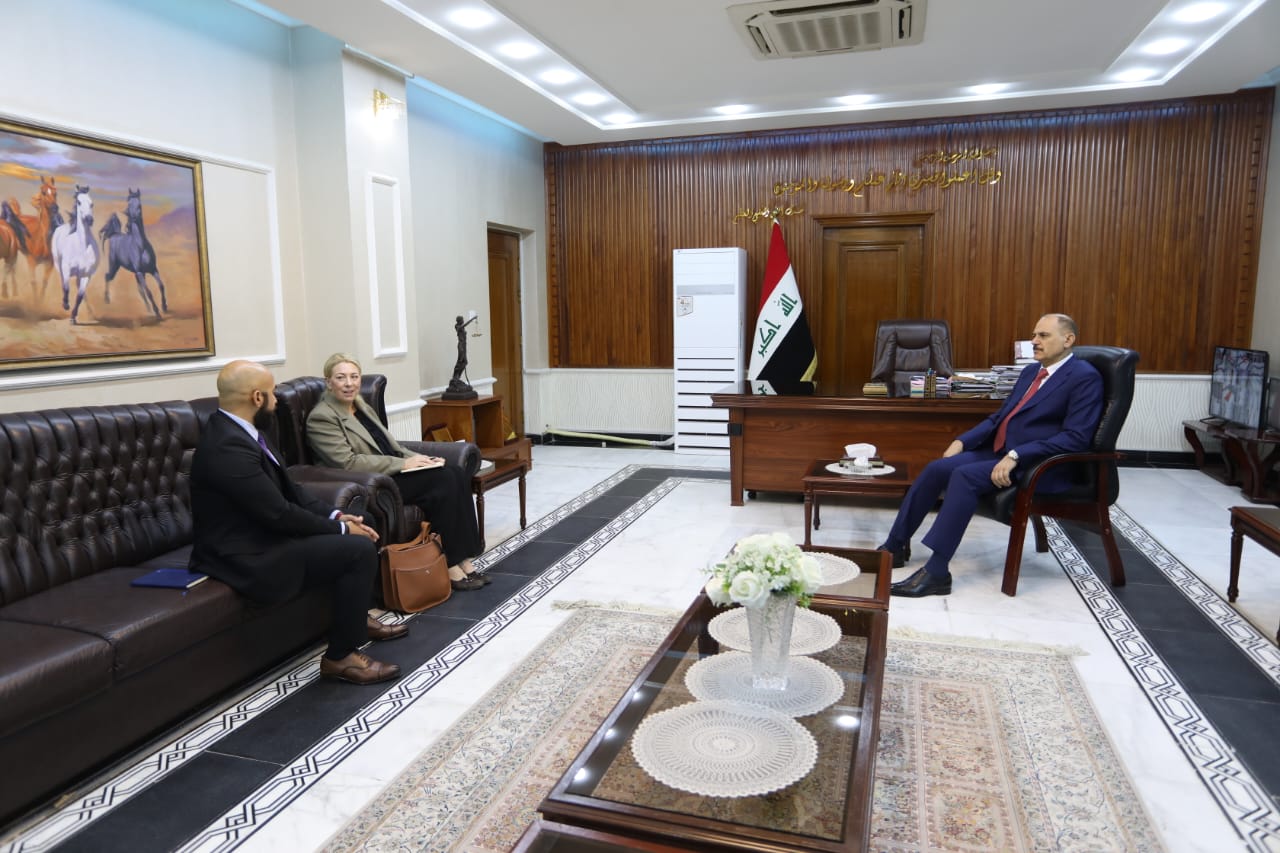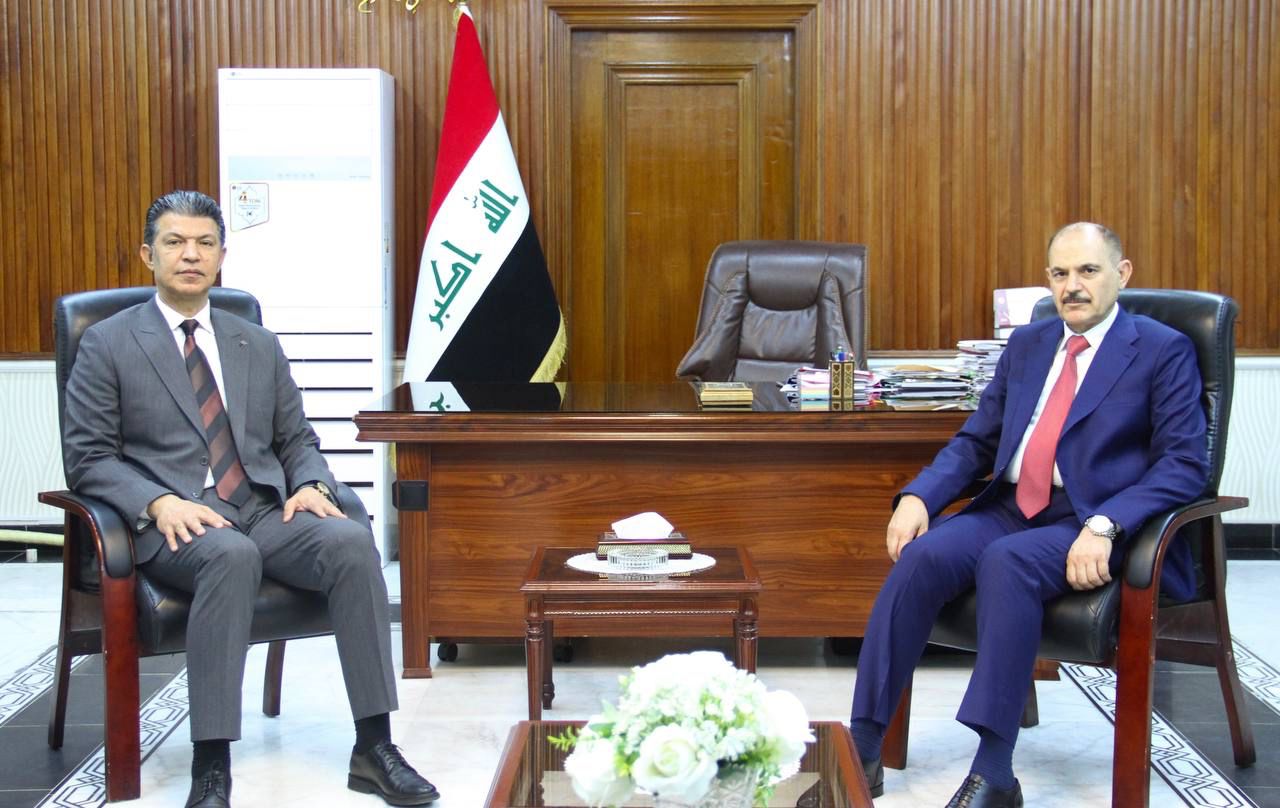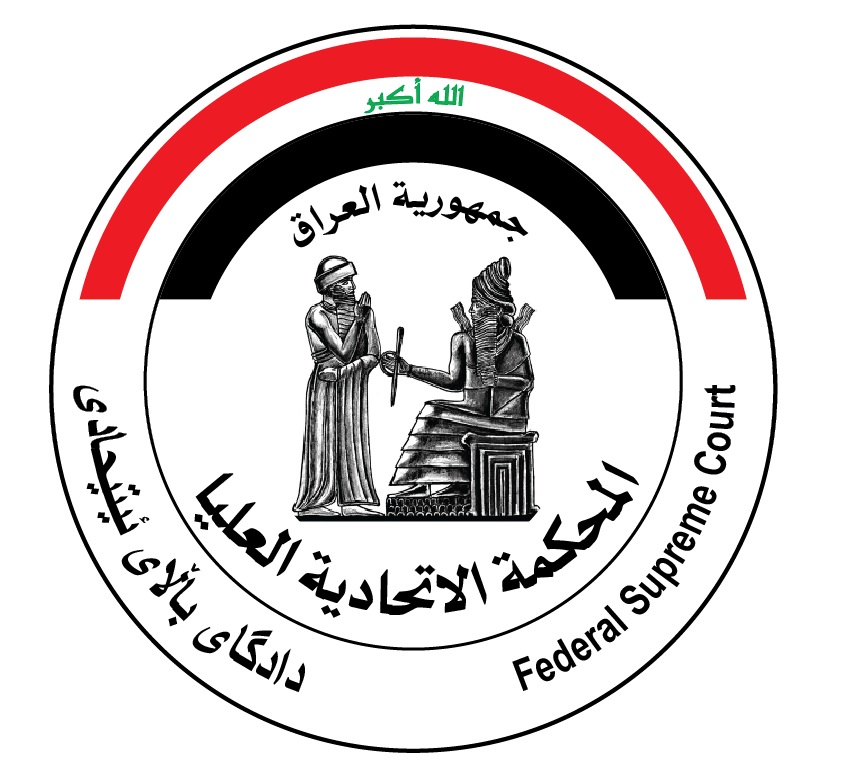
The President of the Federal Supreme Court defines the foundations and basics of the decisions issued by it
Baghdad/ Media of the Federal Supreme Court
On Tuesday, 11/21/2023, the President of the Federal Supreme Court, Jassim Muhammad Al -Amiri, held meetings with the Iraqi News Agency (WAA), through which he explained five basic pillars to which the court is based on its work, and is considered a basis for it when issuing its rulings and decisions, and that these pillars are According to the esteemed president of the court, namely:
1- The supreme interest of the people is through preserving public rights and freedoms and not sacrificing them, which are contained in the Iraqi Constitution of 2005 from Article (14) to Article (46), as not preserving those rights and freedoms means not building correct democratic institutions that lead to building a true parliamentary democracy system.
2- Preserving the unity, safety, independence, and federal democratic system based on the provisions of Article (1) of the Iraqi constitution, which described the regime in Iraq as a unified democratic parliamentarian, and that this constitution is a guarantor of the unity of Iraq, and based on the provisions of Article (109) of the Iraqi constitution that obligated All federal authorities to preserve the unity, sovereignty, safety, and federal democratic system.
3- Preserving the independence of the judiciary in accordance with what is stated in Articles (87, 88, 89, 92, 93) of the Constitution and not allowing this independence to be infringed upon by any external or internal party, and all countries that claim that they have achieved great progress in the democratic system, and that they Taking into account human rights, it must take into account the principle of the independence of the judiciary in Iraq.
4- Do not go beyond the principles of justice and judicial values established by the Iraqi judge throughout his work in the judiciary, as the judges of the Iraqi Federal Supreme Court have a long history in the judiciary, and they have judicial service for very long years. They have established judicial principles and values that cannot be bypassed when sufficient evidence is available to rule on the case in the case. This or that direction, as no judge in the world can go beyond justice if sufficient evidence is available to pronounce it, and going beyond that represents a violation of the principles of justice and correct judicial values.
5- Maintaining the correct and proper application of the constitution and the law in a manner that ensures the achievement of the interest of the people and national unity, and that this constitution preserves Iraq with its unity in the people, land and sovereignty, stressing that 'the constitution is not the property of a party, a party or a nationality, but rather it is accomplished for the Iraqi people with all its components that included the constitution.
As a result of a bitter regime through which the Iraqi people made great sacrifices, the correct and proper application of the Iraqi constitution must be preserved, which is one of the most important foundations of the court’s work.”
6- It is obligatory for everyone, including judges, through their work, especially since their rulings are issued in the name of the people. It is necessary to preserve the blood of Iraq’s martyrs and not allow that blood to be exploited to achieve the personal interests of this or that party, since that blood was provided to build Iraq for all Iraqis. (such as the poor, the needy, workers, farmers, students, and members of the security and military services), pointing out that “the Iraqi martyrs who sacrificed their lives for Iraq are from the families of those groups, and from all other groups of Iraqi society, as all Iraqis are Shiites and Sunnis, Arabs and Kurds, who sacrificed thousands of martyrs. Were it not for that blood, the Iraqi people would not have reached the point at the present time, and the blood of the martyrs must be embodied in the unity of Iraq as stated in the Constitution, and in equality before the law in accordance with what was stated in Article (14) of the Constitution and in the peaceful transfer of power, according to the Article Six of the Constitution and considering that the people are the source and legitimacy of the authorities according to what was stated in Article (5) of the constitution and ensuring the participation of all Iraqis in political life and the practice of their political rights, including the right to vote, election and nomination according to what was stated in Article (20) The constitution, in a way that leads to the preservation of public funds and the sanctity of those funds and in a way that leads to the fair distribution of the country’s wealth to all the Iraqi people according to Article (27/1st) of the constitution, and in a way that leads to ensuring freedom of expression of opinion to all Iraqis according to what was stated in Article ( 38) from the constitution.
The President of the Federal Supreme Court said: “The Federal Supreme Court derives the justice of its decisions from the Iraqi people, and it must be returned to the people to clarify whether those decisions are fair or unfair,” indicating that “The Iraqi judge, whether in the Federal Court or elsewhere, issues his ruling in the name of the people.” He does not rule in the name of the interest of a particular party, nationality, or group of society.”
Final and Binding Decisions
He indicated that `` based on the provisions of Article (94) of the Iraqi Constitution, the decisions of the Federal Court are binding and binding on all persons and authorities, and these bits, his philosophy, is coming from the competencies of the Federal Court mentioned in Article (93) of the Constitution, pointing out that 'the House of Representatives and based on the provisions of Article (49/ First) of the constitution is from a number of members who represent the entire Iraqi people with one seat for every 100,000 people, as when the Iraqi people went out on millions on October 15, 2005 for the polls to referendum on the constitutional referendum, His exit was a great achievement and through the constitution. He added that 'the Iraqi people were inspired by the Constitution, as it crawled for the first time in history for the polls of the polls in millions, men, women, graying and young men on the fifteenth of October of the year of two thousand and five AD, recalling the chain of sectarian repression and inspiration, so the martyrs of Iraq came Shiites and a year in the Arabs, Kurds and Turkmen and the components of all the people are realities. Upon their referendum on the constitution, the sacred cities of the popular uprising and the national repression in the massacres of Halabja, Parzan, Anfal, the Faili Kurds and the tragedies of Turkmen in Bashir and the suffering of our people in the western region from liquidating their leaders, symbols, elders, displacement of their competencies and drying their intellectual sources, so it is not possible in any way to any party to work as a dispute For the constitution, as it describes the decisions of the Federal Court in its 94th and binding article, and therefore these bits are required to be applied to what was stated in it.
Constitutional Violation
He stressed that “failing to implement the final and binding decisions of the Federal Court is considered a violation of the Constitution,” noting that “the decisions of the Federal Court are clear in their meanings and finality, and therefore when the Federal Court issues its decision, it must be adhered to by all other political and other parties.”
Execution of the Decisions
He stated that; the Federal Court pronounces its decisions and other parties must implement the decision because the Federal Court itself does not implement the decision, but rather other parties must implement the decision following what is stated in it.
He stressed that; all the peoples of the world view the legislative authority with sanctity and respect, because of the ability, potential, and powers of this institution that are capable, through and through it, of pushing the country and its people forward, and, on the contrary, leading it backwards, noting that this institution has been carried in all countries of the world. There are many names, including Parliament, a National Assembly, or a Council of Representatives, but no matter how many names there are, Parliament remains a leader, guide, legislator, monitor, and control of all the activities of the state and its institutions, as it legislates for it and its citizens, monitors and holds the executive authority accountable, and respects the independence of the judiciary.
Tasks of the Parliament
He continued that 'the use of parliament in a direction that does not serve the people and the homeland, as it is a deviation in the democratic process from its right path, and thus demolishing the pillars of the democratic system that the constitution of the Republic of Iraq focused on building all democratic institutions in light of Iraq, "stressing" the need for Parliament to be the sanctuary of the sanctity of the tasks that It is done, and it embodies the hopes, aspirations and goals of the Iraqi people, and not to use any path that would hinder the achievement of the goals of this constitutional institution.
